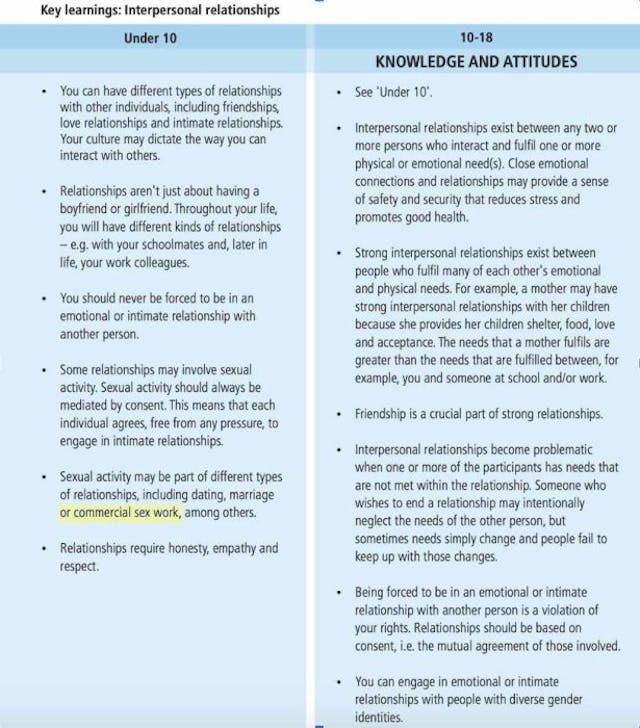
Sen. Josh Hawley and ADF attorney Erin Hawley launch pro-life nonprofit
Bridget Sielicki
·
International Planned Parenthood’s normalization of prostitution to young children is reprehensible
The International Planned Parenthood Foundation (IPPF) recently drew fire for a sex education toolkit it released in 2017 containing some controversial statements, which were originally brought to light on Twitter by Nicole Solas of the Independent Women’s Forum. Specifically, the document identified “commercial sex work” as a type of “interpersonal relationship” – along with dating and marriage – about which children under the age of 10 should be taught.
As a former prostitute and someone who cares deeply about children, I find this notion highly objectionable. I know from personal experience that the world of so-called “commercial sex work” is founded on exploitation and is devoid of true happiness – a world which nobody with children’s legitimate best interests at heart should wish to promote, or even condone, to these innocents.

“FREE FROM ANY PRESSURE”
The very same page of the IPPF toolkit states: “Sexual activity should always be mediated by consent. This means that each individual agrees, free from any pressure, to engage in intimate relationships.” This statement is problematic as applied to so-called “commercial sex work.”
Firstly, I never encountered a single prostitute – myself included – in all my seven years working as a call girl whom I would characterize as being “free from pressure” to engage in paid sex. I had many close friends and acquaintances in the business, and we were all in it because we felt pressure of some form.
Sex trafficking is real, for one thing – I met some women who were kept in the business of selling sex by pimps and others who forced them to work against their will. But even those of us who were “independent” did not choose prostitution because it was our dream job. Most of us were in situations where we simply needed the money and lacked other means of earning it. I knew prostitutes who worked in underpaid day jobs – public school teachers, for example – with bills they couldn’t afford to pay, including medical bills; women with virtually no education or traditional job skills struggling to pay rent in California, where the cost of living is outrageous; and countless college students with legitimate career aspirations who were earning tuition money for prerequisite degrees by selling the use of their bodies by the hour.
Virtually all of us had some version of one of those stories.
PAID SEX ISN’T LEGITIMATE INTIMACY
Secondly, IPPF’s characterization of the relationship between a prostitute and her clients as “intimate” is misleading. Simply because sex occurs does not mean there is true intimacy. “Intimacy” is defined as “a close, familiar, and usually affectionate or loving personal relationship with another person.”
There can be no true closeness or familiarity in a relationship where, most often, the individuals involved don’t even know one another’s real names. Almost all prostitutes use a fake name for the express purpose of putting up a barrier between themselves and their clients – they do not want their clients to truly know them. And many clients use fake names to protect their own privacy, as well.
Article continues below
Dear Reader,
In 2026, Live Action is heading straight where the battle is fiercest: college campuses.
We have a bold initiative to establish 100 Live Action campus chapters within the next year, and your partnership will make it a success!
Your support today will help train and equip young leaders, bring Live Action’s educational content into academic environments, host on-campus events and debates, and empower students to challenge the pro-abortion status quo with truth and compassion.
Invest in pro-life grassroots outreach and cultural formation with your DOUBLED year-end gift!
Furthermore, relationships between prostitutes and clients are not truly loving – on the contrary, they are exploitative. St. Thomas Aquinas said: “To love is to will the good of the other.” But prostitutes do not will the good of their clients, nor vice versa.
It is not good for clients – most of whom are married men – to divert large sums of money from their families and/or other things that would legitimately and sustainably enrich their lives in order to squander it on fleeting physical pleasure. To cash in on someone’s desire for pleasure, and, often, their weakness in the self-control department, is not to will that person’s good. In this way, prostitutes exploit their clients.
Likewise, treating a human being as a mere menu of parts and sexual “services” is not willing that person’s good, either. Clients even write reviews for prostitutes – like restaurants – in which sex acts that are “on the menu” are described in detail, and every aspect of the prostitute’s physical appearance and attitude is critiqued. In this way, clients exploit prostitutes.
Clients use prostitutes for sexual pleasure, and prostitutes use clients for financial gain. This sort of transactional relationship is not about willing the good of the other, and does not manifest true intimacy.
CHILDREN SHOULD BE SHIELDED FROM EXPLOITATION
Children should be protected from exploitation – they should not have exploitation promoted to them as a legitimate way of relating to other people.
Promoting – or even just whitewashing – prostitution to children does not will their good, and is therefore unloving. No parent or educator should wish for a child in their charge to embark upon a life in which they exploit the financial needs of others for their own momentary pleasure, nor one in which they exploit the weaknesses of others for financial gain.
Neither path leads to true happiness or freedom. And it is not loving to lie to children by telling them otherwise.
Live Action News is pro-life news and commentary from a pro-life perspective.
Contact editor@liveaction.org for questions, corrections, or if you are seeking permission to reprint any Live Action News content.
Guest Articles: To submit a guest article to Live Action News, email editor@liveaction.org with an attached Word document of 800-1000 words. Please also attach any photos relevant to your submission if applicable. If your submission is accepted for publication, you will be notified within three weeks. Guest articles are not compensated (see our Open License Agreement). Thank you for your interest in Live Action News!

Bridget Sielicki
·
Issues
Angeline Tan
·
Guest Column
Emily Berning
·
Opinion
Nancy Flanders
·
Opinion
Mark Wiltz
·
Opinion
Mark Wiltz
·
International
Bettina di Fiore
·
Human Rights
Bettina di Fiore
·
Politics
Bettina di Fiore
·
Human Interest
Bettina di Fiore
·
Activism
Bettina di Fiore
·